Today these words can finally come out on paper, because the fear and the lump in the throat — for now — are appeased. The peace agreements with social justice between the organizations and the Ecuadorean government were signed on Thursday, June 30. Now they are in the vigil process with a term of 90 days for their fulfillment.
I had the privilege of accompanying the mobilization these 18 days as an Ecuadorian who believes in social justice, and witnessed the struggle and resistance of the indigenous movement, together with the Afro and Montubio people, the social organizations, doctors, students, artists, workers’ unions, truck drivers, teachers, mothers, grandfathers, grandmothers, parents, dissidents, communicators, feminists and other popular sectors that supported the National Strike until reaching minimum agreements that are the foundation of public policies for a Constitutional State of rights and justice.
Para leer este artículo en Español haz click AQUÍ
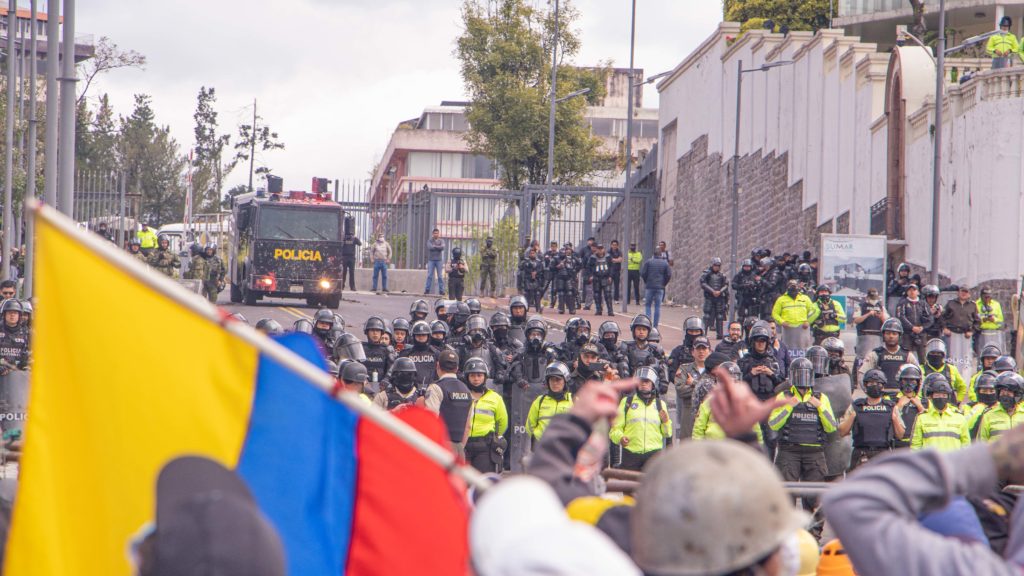
On June 13, 2022, the Confederation of Indigenous Nationalities of Ecuador (Conaie), an organization that brings together the indigenous movement of this country in its three regions: Coast, Sierra and Amazon, announced the National Strike, a resolution agreed to with its organizational bases against the difficult economic situation that the most neglected areas of the country are going through, but which are the basis of its production: the farmers. Quite simply, without work in the fields, the city is not fed.
The official media attempted to delegitimize this paralysis, which, among other de facto measures such as the closure of highways, achieved symbolic seizures of public institutions in several provinces of Ecuador. They were, however, unable to distort the scope of the generalized social discontent that led to one of the largest national strikes in Ecuadorian history, if one considers its strategic deployment in the 24 provinces of the country. In the cities, food was beginning to be scarce — but not the solidarity of the population, who, inasmuch as possible, organized themselves for the response with humanitarian reception centers, donations, medical centers and soup kitchens.
At the same time as being considered the largest National Strike due to its high concentration of protesters in the streets, unfortunately, also as a result of the national strike of October 2019, Ecuador experienced the strongest repression with horrific consequences by the armed forces and police, who even before the state of emergency was declared by executive decree, were on the borders of each province to prevent the advance of social protest towards the capital with tear gas and rubber bullets. Days earlier, the government in power and the National Assembly had authorized the progressive use of force against the demonstrators, stigmatizing them as criminals and vandals.
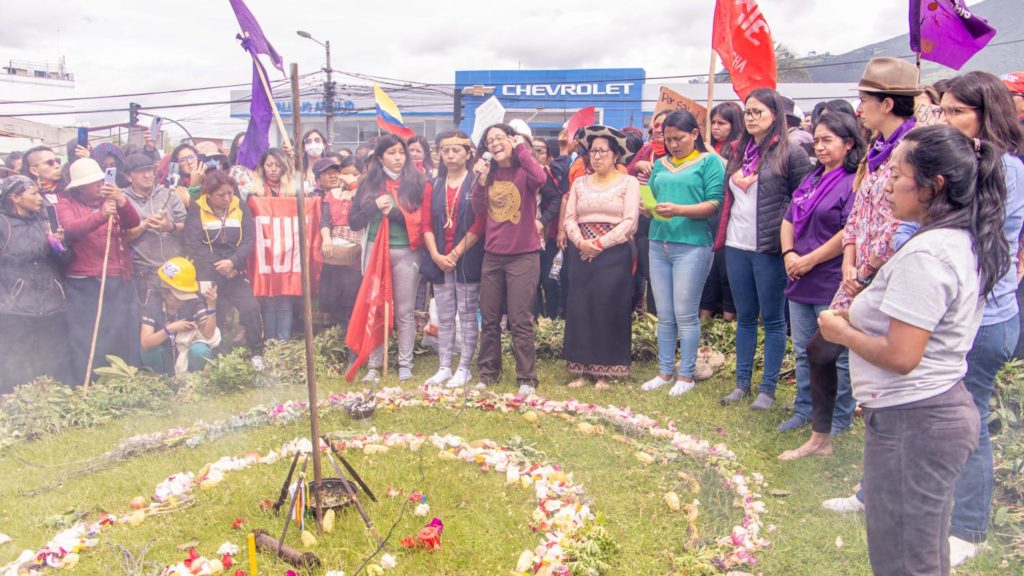
Ten points were raised by Conaie. They were not looking for a coup d’état or to destabilize the country, but rather to raise their voices of protest to demand compliance with the dialogues that took place a year ago as a result of the same strike in October 2019. After the three meetings were held with the organizations, these agreements were just filed in a government desk. If the government would fall, it would be by its own weight, with or without the National Assembly, but the central axis of the mobilization was the 10 points. Without them, the de facto measures in the other provinces would not go away or be lifted.
One of the most sensitive points touched on the extractive policy of mining and oil in intangible, sacred areas and indigenous territories, but thanks to the agreement, Decree 95 on oil expansion was repealed and Decree 151 of the mining law must include reforms and prevent its extraction in indigenous peoples’ sacred areas. In addition, the obligation of prior, free and informed consultation, as established in Convention 169 for indigenous peoples of the International Labor Organization, ILO.
The agreement, with the mediation of the Ecuadorian Episcopal Conference, was reached in a process of dialogue with results, important points to largely compensate the blow to the economy. In addition, working groups will be installed for the treatment of the other points of Conaie’s manifesto.
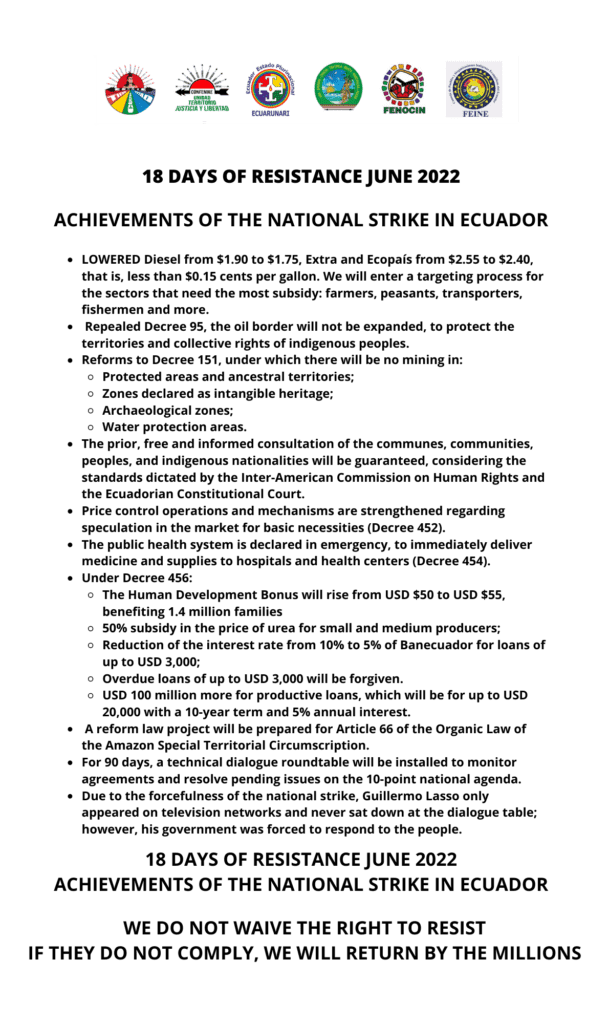
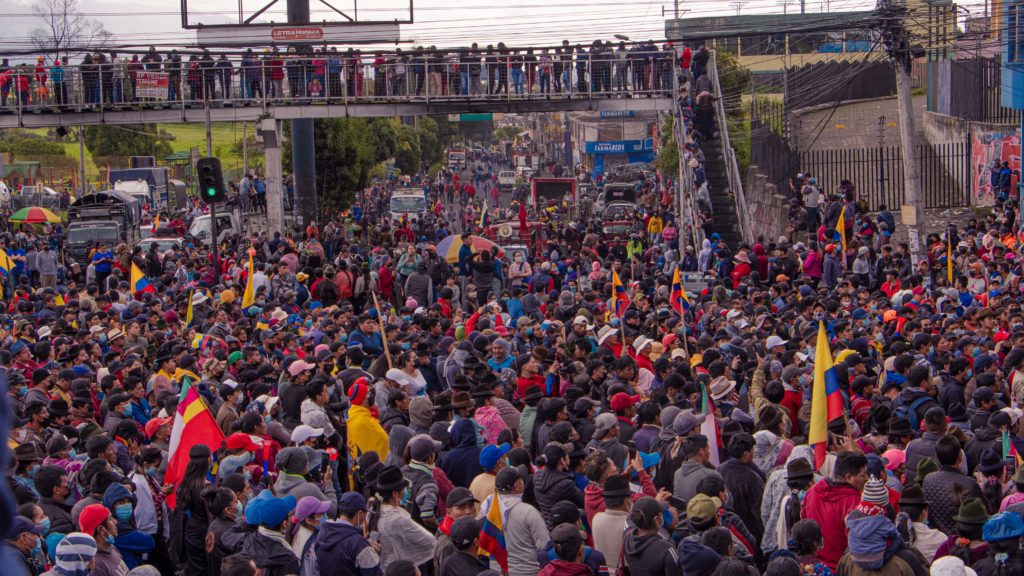
The positioning of the community organization and democracy (Guaranteed in Art. 95 of the Ecuadorian Constitution) is also highlighted, in which as a philosophy and practice of life, unilateral measures are never taken, but are decided in permanent consultation and approval of the social bases.
Another relevant fact is that the alternative and community media were at the forefront informing the country from each territory and risking their lives to break the media siege, established by the conventional media whose interests in the region a long time ago, are no longer dedicated to their informative role but rather to propaganda for a single and hegemonic discourse and the systematic attack on legitimate popular struggles.
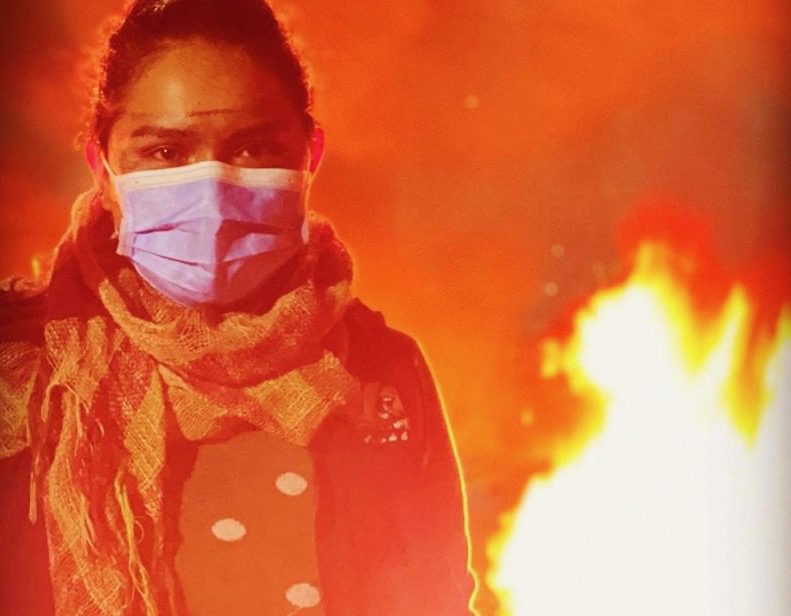
Katy Machoa, former leader for women and the family of Conaie; Indira Vargas, communicator of the Voice of the Confeniae; and, Mallu Muniz, a Brazilian academic and professor at the Central University of Ecuador, in this interview with Arturo Guerrero for Radio Unitierra, from the Séptimo Sol program in Oaxaca, Mexico, recounted this process one day before the signing of the agreement, with the expectation that they would reach a final resolution.
We share a small translated extract from the interview. To read the whole transcript in Spanish click HERE.
Arturo: Could you tell us what the strike is for our audience? That is, how do they carry out the strike, what activities do they do or do not do and who is participating? Because they told us a little while ago that this is not a mobilization of the original peoples, but that there are different sectors of society participating. And also something that was anticipated to us is that this mobilization, this series of mobilizations in Ecuador do not arise from a conjunctural situation, but that it has been working, it has been gestating in advance. So a second question is how did we get here: How did this series of recent mobilizations that result in 18 days of strike come about? And where does this mobilization of the sectors come from?
Mallu: Katy and Indira will be able to explain how they organically took part. But it is worth mentioning that in addition to this strike that has 10 very solid points, there are 10 points that were previously in 2015 and 2019 that there were also national strikes. An interesting question to explain for those who do not know and are not aware of the geography of unemployment is that Ecuador is a country divided between the Sierra, the Coast and the Amazon. Of course there are mobilizations in the Amazon, mobilizations also on the coast, but mostly Quito concentrates these mobilization spaces.
So, when we talk about national unemployment, one characteristic is that many of the Amazonian, Shuar, Achuar, Kichwa, Waorani peoples, all the nationalities that make up Ecuador. Since 2008 Ecuador has been a multinational and intercultural country. They are marching towards the city of Quito. And one thing that is interesting to draw attention to is that historically they always had a place to arrive and in this strike what has been done is that the National Police have taken this space. They have prevented people who came from outside Quito from establishing themselves in this space that is the House of Culture.
So, two Sundays ago the National Police, unconstitutionally, improperly, took over this space precisely to prevent them from having a place to go. So, the best way I can, I feel like a representative, as a teacher of the Central University of Ecuador, which is the largest university located in Quito, which has been this space for humanitarian aid, a collection center.
Right now there is a call to meet there, in front of this university, which has a role as a public university, a university of the people themselves. An important role at this time of the strike, both as a space for reception, storage, receiving donations, etc., receiving the same people.
Today they said in the chat group that more people are arriving this morning at 06:03 in the morning, a thousand new people were there and they needed resources, they needed donations, but above all it is also important to say that we teachers, particularly from the faculty to which I belong, of the social and human sciences, all there as students also of the Social Work degree, as a collection center, all mobilized to give support, to give support, this space, that humanitarian center, that is to say, to emphasize lastly, it has not been respected.
On several occasions, the police have tried to invade, have thrown bombs, have put the women, the children who were there being protected in this space, and the elderly at risk. So it has been a bit of this geography of unemployment, that there is a lot to really say about it, but so that you understand a bit how this dynamic is.
Arturo: So, to clarify, how did this strike start? What are the origins of these mobilizations in Ecuador today?
Katy Machoa: Yes. Once again, thanks to this communication medium, we want to tell you that at CONAIE we have an official page where we have made an effort to explain this process both to the National Government and to the world, and we want to tell you that we have a a year of, let’s say, being able to put our demands, our needs into consideration by the central government.
And so it is that on June 11 in the province of Cotopaxi, Latacunga, where our fellow president Leonidas Iza comes from, in a march for dignity, this was already handed over to the competent authorities in Carondelet on August 5. After October 4, in a public way, a first dialogue was held where the different ministers were with our community authorities in Carondelet.
Later, on November 10, there was a second dialogue at the Government Palace in Carondelet, again dealing with the issues that were later consolidated and are now known as the ten points. It turns out that 367 days passed and there was no response. We are peoples of dialogue, we are peoples of peace, we have had a one-year process, if we take into account June 2021 to June 2022, which we also tell you and greet you from this land of the straight Sun that right now we are celebrating the holidays of Inti Raymi, the celebrations of the Sun.
We are also very grateful for this, reminding those who listen to us that in the ’90s the indigenous uprising was also known as the Inti Raymi uprising. So that is why today we are talking about the fact that this is a second uprising, that we are in Inti Raymi and that we are fighting for our rights.
In conclusion, on May 20 of this year, 2022, without a response from the government, in a collective assembly, it was decided to go on indefinite national strike, so that is the moment in which we find ourselves.
Arturo: What are the other demands that the government did not respond to?
Katy: We have ten points that are central. I would like to briefly mention: Number One that we told you from the beginning, when the Lasso government took office, is to freeze the prices of both diesel fuel and extra gasoline in the country.
And in fact, a parenthesis right now, that’s the hard point, if you will, of the negotiating agreement. Then we have a moratorium on the debt with the banks, with the entire banking system, since due to the Covid framework there is a series of indebtedness for agriculture, especially for subsistence, which cannot be covered and are suffocating family economies.
And the other thing we are asking for is fair prices for products from the countryside and the territories, since the government, and this is something that bothers people a lot, said that the rise in fuels was not going to affect it, it was not going to have greater acceptance in the general economy of the country. However, basic necessities and the basic basket have risen above $700.
While it is not true, there is an imbalance with respect to the products of the field, that let’s say, the prices are very low. Today there have been a series of regulations regarding labor rights and also offers from the president regarding employment. And none of that has been fulfilled and respected in terms of labor matters.
Later, another thing that my colleague Indira mentioned is the moratorium on the expansion of the extractive frontier. So, it is always thought that indigenous territories are a source or are only seen as money — and we ask that this must be reviewed, that it must be analyzed, at least, in those that are sources of water.
Then, as this is a multinational country, we ask as a 6th point respect for the 21 collective rights that we have. As a 7th point we are asking for the non-privatization of strategic sectors. There are issues like the bank here in Ecuador, which wants to be put to privatize sectors such as electricity, water. So we ask that it stop.
As an 8th point, we also ask for policies to control speculation in the market for basic necessities, which is what we were saying. And yes, there is a lot to talk about here, but basically we have products that are elaborated, that now have raised the price a lot and you will be able to see the oil. It is one of the things that has risen the most and that has most outraged everyone. And there comment there is a video.
I would like to appeal again to this media to help us spread our situation, because even the children are protesting. They are concerned because they can’t enjoy “salchipapas” (french fries with sausage) due to the high prices of all the ingredients, specially the oil.
Well, then we have access to the university, which is point nine. Another point is that youth now still have barriers to enter the university. And as a 10th point, what is raised is security, protection and generation of effective policies for the wave of violence. As is known worldwide, Ecuador in recent months experienced the worst prison crisis that later began to be reflected in general in society, murders in the street in broad daylight.
And for all this, it is the 7th point that we raise now, to tell you that we know that all this is not what we are asking for now. That is why the idea is to be able to maintain a dialogue and that the issues that can be resolved by decree, then do so and that we can make a plan, an agreement to deal with the points that we say require analysis in a given time. So this is what is being discussed at the moment and we hope that this strike will end today.
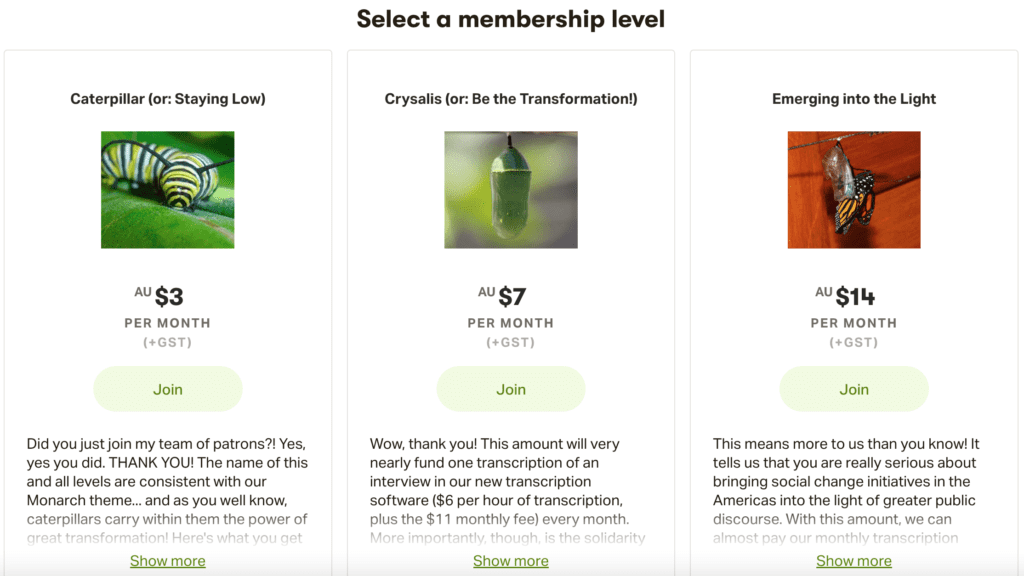
I greatly appreciate your article 18 Days of Resistance in Ecuador by Alejandra Tapia. The information provided in this article is valuable to understanding the issues behind the strike and reasons the people were so dedicated to seeing it through. In my work with the Cañari Nation in southern Ecuador I saw a total determination on the part of that community to make the sacrifices needed to bring this action to a successful conclusion. They supported each other in maintaining the roadblocks and supported their representatives who went to Quito. When the agreement was signed, representatives returned home where they were received as heroes.
This was Inti Raymi and the farming association Mushuk Yuyay had made plans for an elaborate celebration of seeds they called Muyu Fest. The event included planting on new lines of quinua as well as meetings with delegations from other provinces and international organizations. The celebration was immediately cancelled because of the urgency of the action to resist the abuses of the Lasso government and to guarantee of rights so valuable to building a future for the People of Ecuador. The Cañari people are rightfully proud of what they accomplished through their resistance. Muyu Fest will take place in September instead, and be even bigger than the one we had planned for June.
Alan, thank you so much for your response and for this information. We would love to have an update on the situation with the Cañari people if and when you are ready to do that. It is great to hear from you!